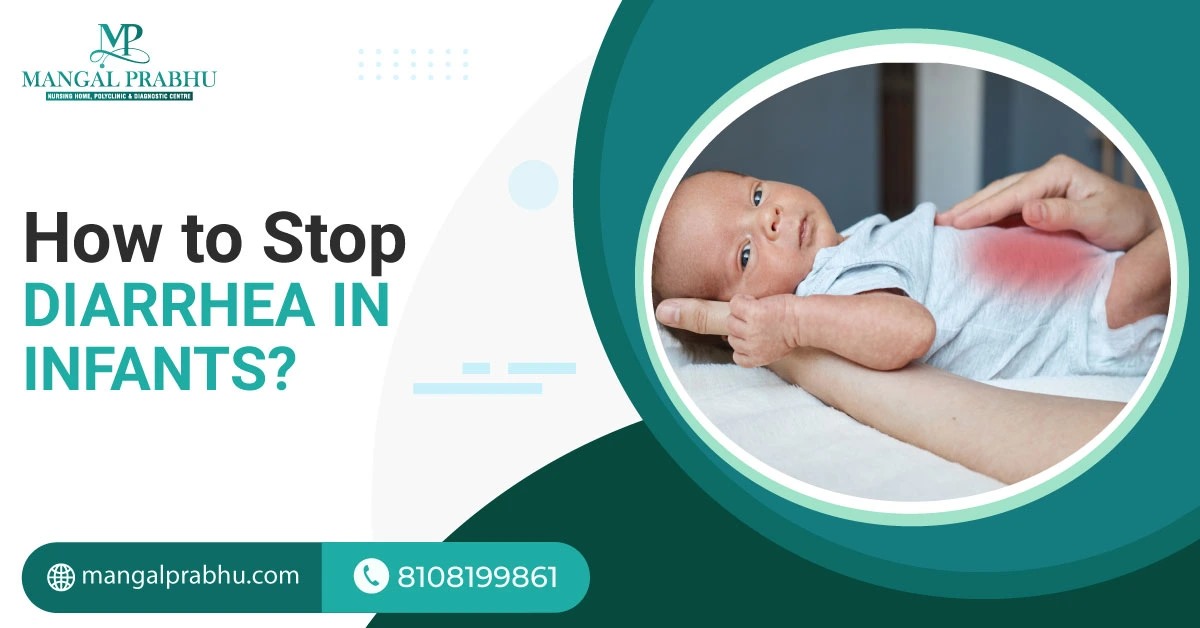
How to Stop Diarrhea in Infants?
Baby’s poop can be of different colors, textures, and odors, depending on their age and what they are eating (breastmilk, formula, or solids). It’s usually softer than an adult’s poop and can vary in frequency. However, if you notice stools that are too watery, loose, and more frequent than usual (three or more) in 24 hours, it could indicate diarrhea. Let’s check out the causes, symptoms, and treatment for pediatric diarrhea in Navi Mumbai.
Common Causes of Diarrhea in Infants
Here’s what may cause diarrhea in infants:
a) Viral Infections:
A viral infection is the most common cause of diarrhea in babies. Rotavirus and other viruses can spread easily by touching contaminated surfaces. Fortunately, vaccines are available for viral infections.
b) Bacterial Infections:
E. coli, Salmonella, and Shigella are common bacteria that can cause diarrhea with fever, stomach cramps, and vomiting in infants. Some are found in undercooked foods, and others may spread in certain environments, like daycare.
c) Food Allergies:
Your baby could be lactose intolerant or have a cow’s milk protein allergy. If they consume these foods or the breastfeeding mother consumes lactose-rich products, the baby could experience diarrhea.
d) Teething:
When infants start teething, they develop the habit of chewing on nearly everything they get. This can introduce germs to their mouth, leading to episodes of diarrhea. Teething also leads to excessive saliva production, which, when swallowed, can cause loose stools.
Recognizing Symptoms of Diarrhea
The most common symptom of diarrhea in infants is dehydration. It can happen pretty quickly (within 2-3 days or sooner) if the baby consistently passes loose, watery stools. Depending on the cause of the diarrhea, the parents might notice other symptoms, such as:
- Blood in the stools
- Vomiting
- Fever
- Abdominal pain
How to Stop Diarrhea in Infants? Home Remedies and Care Tips
Immediate care and medical attention (in severe cases) are required. However, these tips are often effective for mild diarrhea:
i) Adequate Hydration:
Continue offering breastmilk and formula to your baby to keep them hydrated. Breastfeeding provides many essential nutrients and antibodies that help your baby recover quickly. If required, you can offer a few sips of ORS to maintain the electrolyte balance and restore the lost fluid.
ii) Appropriate Dietary Adjustments:
Diarrhea can be a problem in babies who have just started solids. Adjust their diets by focusing more on applesauce, bananas, toast, and rice, which are lightweight on their digestive system. Avoid fruit juices and other sugary foods until their digestive health improves.
iii) Importance of Hygiene:
Diarrhea can lead to frequent diaper changes, which can cause a diaper rash. To avoid that, keep your baby’s genitals clean and dry. Give them diaper-free time.
When to See a Doctor
Mild diarrhea resolves on its own with time. However, if things get out of control and you notice excessively watery stools multiple times a day, it’s best to see a pediatrician in Navi Mumbai. Dehydration is a common complication of diarrhea and can be life-threatening if left untreated. So, take care of your baby’s hydration and maintain good hygiene at home.

Danger Signs of Pneumonia in Infants?
Newborns are vulnerable to respiratory infections such as pneumonia as their immune systems are weak due to their fragile lives. Looking for a professional consultant in paediatrics from the very beginning is the most crucial step that could be a preventive measure. This article guides the red alert signs and symptoms in infants that should be followed to book an immediate appointment with a qualified pediatrician in Navi Mumbai. Early diagnosis and treatment significantly decrease morbidity and mortality among paediatric pneumonia patients.
Common Symptoms of Pneumonia in Infants
Some common signs babies may demonstrate are coughing, wheezing, grunting while breathing, difficulty breathing, and high temperature or fever. In addition, symptoms such as poor appetite and low energy and activity levels may be observed in infants. If reported early and consulted by a paediatrician in Navi Mumbai, these symptoms can help cure the disease of Infants Pneumonia Treatment in Navi Mumbai more efficiently.
Red Flags and Danger Signs
Parents need to be observant of rapid, shallow breathing or a suffusion of bluish color, especially on the lips and fingertips. Coughing with a lot of retractions or with grunting sounds is also indicative of a serious condition. Infants show their tiredness through lethargy and struggling to wake up. Such symptoms should be taken as a cue to the parents to get the needed treatment from a pediatrician in Navi Mumbai for their kids immediately.
Immediate Actions to Take
The parent should immediately not hesitate to call for an ambulance or take the infant to the nearest hospital or clinic to consult a paediatrician. Providing the baby with relief like warming, sitting upright, and offering oral rehydration with fluids is essential for the baby to recover. Beware of drug operations without the doctor’s advice since they can do more damage than good. It is paramount to introduce infant pneumonia treatment in Navi Mumbai at present.
Prevention and Vaccination
Routine vaccinations recommended by Navi Mumbai paediatricians play a huge role in preventing pneumonia. These include pneumococcal and flu shots. Parents must also maintain hygiene and avoid overcrowding. Regular handwashing, cleaning toys and surfaces, and proper ventilation reduce transmission of infections requiring Infants Pneumonia Treatment in Navi Mumbai in the first place.
Conclusion
Paying attention to and detecting both mild and severe symptoms of pneumonia in infants early is the key to prompt treatment of the disease. To get the best possible outcome for a child suffering from pneumonia, you must consult a paediatrician with experience in this field. Parents and all the caregivers of the children living in Navi Mumbai should prevent and seek medical aid from a certified paediatrician immediately whenever any symptom appears for better results. After all, following the expert recommendations to keep myself clean and healthy helps the baby to stay far from sicknesses and complications.

How is Pneumonia Treated?
Pneumonia is the infection and inflammation of the lungs that can cause fever, cough, and mucus that could be yellow or bloody. Pneumonia can be caused by a viral or bacterial infection and can affect one or both lungs. It’s important to see a general physician in Navi Mumbai if you have trouble breathing and excess cough with fever. Pneumonia can spread through contact with the infected person or inhaling the infected air.
Symptoms of Pneumonia
Symptoms of pneumonia may vary from person to person. It can be different for adults and kids. The symptoms can appear suddenly or might develop gradually and worsen over time. Here’s what you might experience if you have contracted pneumonia.
- High fever
- Rapid and trouble breathing
- Chest pain from constant coughing
- Loss of appetite
- Shortness of breath
- A blue tint on lips and skin
- Extreme fatigue
- Confusion
Viral pneumonia can produce other symptoms, including dry cough and weakness. The symptoms can be different in kids. They might have trouble and noisy breathing with chills and fever.
Treatment of Pneumonia
For diagnosis, your doctor may conduct a physical exam where they check your breathing. They will conduct additional tests, including X-rays and blood tests to confirm the diagnosis. They will check how well your lungs are functioning and the amount of fluid inside each lung. Here’s how it’s treated.
- Antibiotics: Pneumonia can be caused by viral or bacterial infection. The latter produces more complicated symptoms and is more difficult to treat than a viral infection, which may sometimes resolve on its own. If it’s a bacterial infection, your healthcare provider may prescribe you antibiotics.
- Over-the-counter medications: You can get relief from the symptoms, such as high fever and constant coughing from over-the-counter medication.
- Bed Rest: Your doctor will advise you to take ample rest to keep the symptoms at bay. You must use a humidifier and drink enough fluids to prevent dehydration.
Also Read: Signs And Symptoms Of Asthma
How to Prevent Pneumonia?
Certain prevention tips can help protect you from catching pneumonia in the first place. Here’s what can help you prevent it.
1) Vaccines
Getting vaccinated for pneumococcal bacteria can help keep you from pneumonia, although vaccination alone doesn’t guarantee protection from pneumonia caused by different viruses and bacteria. Vaccination does help prevent the condition from getting worse, though.
2) Good Hygiene Practices
A few healthy habits and some changes in your lifestyle can help reduce your risk of catching pneumonia. Here’s what can help.
- Quit smoking
- Avoid touching your face with your hands, especially without sanitizing. Wash your hands before eating and drinking
- Avoid physical contact with people with severe cough, fever, and other symptoms of pneumonia.
- Eat a balanced diet with green leafy vegetables, fruits, and other healthy foods.
- Exercise regularly and get ample rest
- Get immediate treatment for any infection, as that increases the risk of contracting pneumonia
- Quit alcohol
Conclusion
Pneumonia can cause symptoms that are often confused with a regular cold and flu. However, if you notice anything unusual, such as cough and bloody mucus, get immediate pneumonia treatment in Navi Mumbai.
